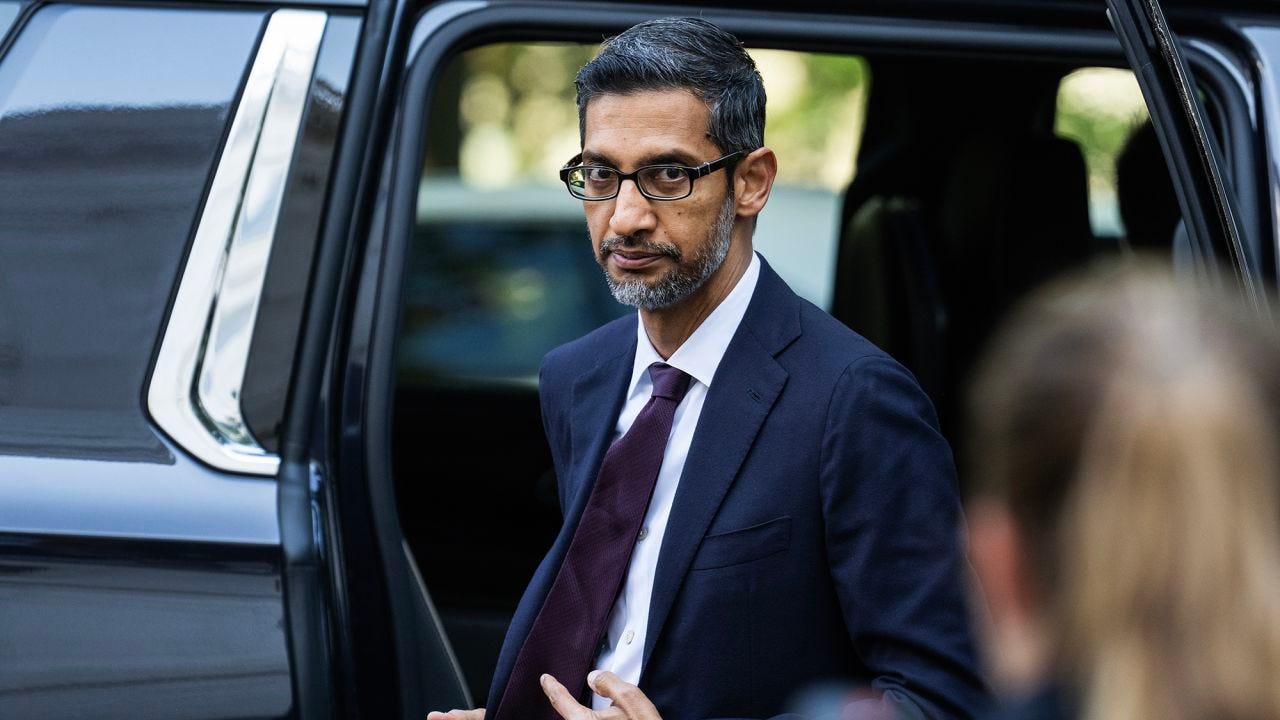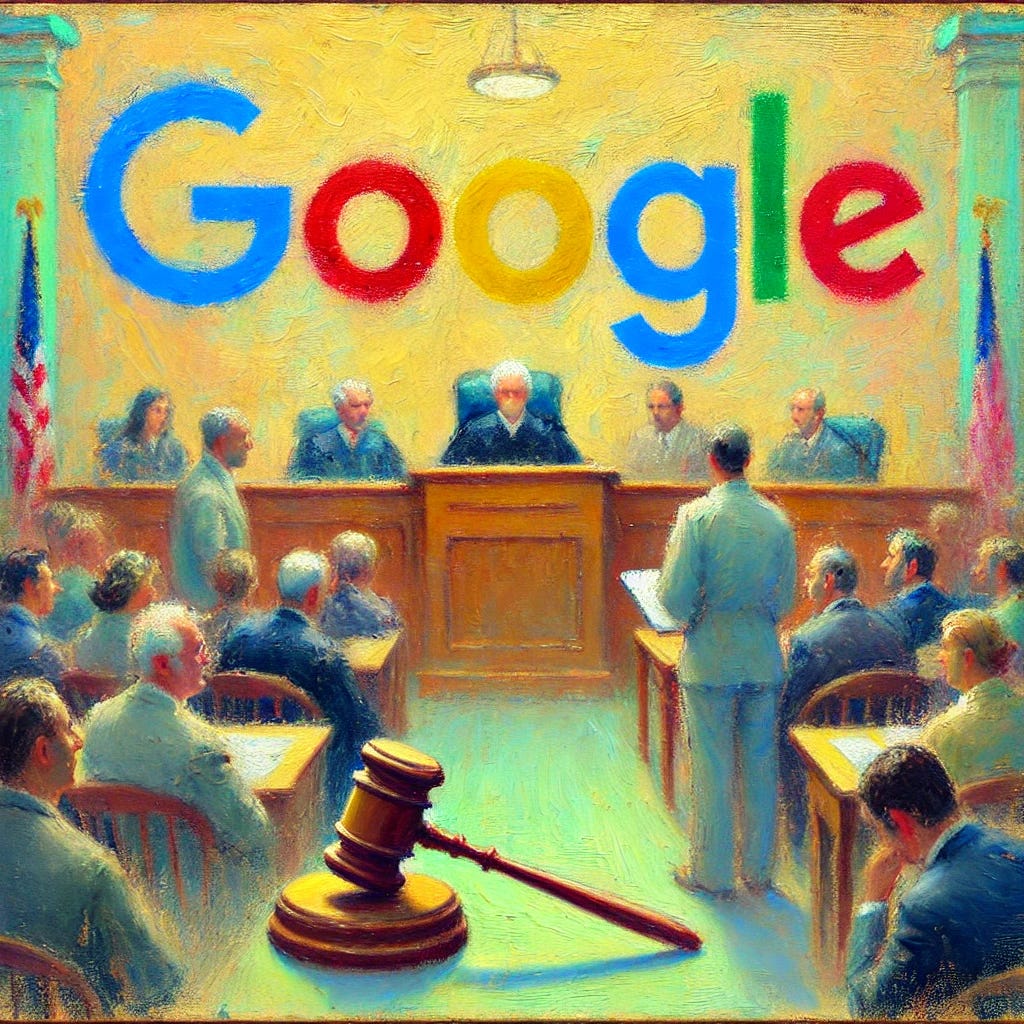Google Found Guilty in Federal Antitrust Lawsuit Filed by US Department of Justice
Judge Amit Mehta ruled "Google is a monopolist, and it has acted as one to maintain its monopoly."
Google Antitrust Verdict: A Tectonic Rift in the Tech Industry
The verdict against Google could not have come at a worse time for the markets. On Monday, U.S. District Court Judge Amit Mehta ruled that Google violated U.S. antitrust laws by maintaining a monopoly in the search and advertising sectors. The decision comes amid a global market meltdown, with NASDAQ closing at 16,200.08, down 3.43%, following equally poor performances on last two days of the previous week. Google’s stock (Alphabet Inc Class C) closed at $160.64, sharply down by 4.61%.
Background of the Case
The antitrust lawsuit, initially filed in 2020 during the Trump administration and continued under the Biden administration, focused on Google's practices in the search engine market. Central to the case were Google's exclusive agreements with browser developers and smartphone manufacturers, such as Apple Inc., where Google paid billions of dollars to secure its position as the default search engine on their devices. The trial, which spanned nearly 10 weeks in October and November last year, saw Google CEO Sundar Pichai as the star witness, facing vigorous questioning by U.S. State counsels.

Federal Judge's Ruling
In his 286-page decision, Judge Mehta declared, "Google is a monopolist, and it has acted as one to maintain its monopoly." He concluded that this behaviour violated Section 2 of the Sherman Act, which prohibits monopolization or attempts to monopolize any part of trade or commerce. The judge found that Google had secured roughly 90% of the internet search market through partnerships with companies like Apple, Samsung, and Verizon.
Google pays companies billions of dollars for prime placement in web browsers and on smartphones. In 2021 alone, Google spent $26 billion to be the default search engine on Apple and Android platforms, with about $18 billion going to Apple. Google also shares 36% of search ad revenue from Safari with Apple. The government argued that these payments for dominant positioning effectively prevented competitors from developing their own search engines to a competitive scale.
Key Points of the Ruling
Monopoly Maintenance: Google illegally maintained its monopoly in the search and search advertising markets.
Exclusive Agreements: The company's exclusive agreements with browser developers and smartphone manufacturers were deemed anticompetitive.
Competitor Disadvantage: Google's practices disadvantaged competitors like Microsoft's Bing.
Next Steps
The ruling on Google's liability is just the first phase of the case. The next phase will determine the appropriate remedies to address Google's anticompetitive behavior. Potential outcomes could include structural changes to Google's business model, modifications to its agreements with other companies, and restrictions on certain business practices. Google is likely to appeal the decision, potentially taking the case to the U.S. Supreme Court.
Potential Consequences
At this stage, there is no mention of Google paying a fine. The focus is on remedies to restore competition in the search market. A breakup of the company into smaller entities remains a possibility, but it's not an immediate outcome of this ruling. Google still has the option to settle the case, but given the significance of the ruling, it's unclear if this is a likely scenario.
Market Reaction and Future Implications
Reuters quoted a Google spokesperson stating that the company plans to appeal the order. Google’s stock (Alphabet Inc Class C) closed at $160.64, down sharply by 4.61%. This decision is expected to have significant implications for both the company and the tech industry as a whole. The verdict comes at a time when Google faces serious challenges to its virtual monopoly in the search engine market, with companies like OpenAI, Anthropic, and Perplexity.ai increasingly being preferred by users as default search engines. Despite these challenges, Google claims its AI-powered Gemini 3.5 is outperforming ChatGPT 4.0 in most parameters.
Potential Impacts
Reshaping Online Access: This ruling could reshape how millions of Americans access information online.
Opening Markets: It could impact Google's dominance in the search market, potentially opening up opportunities for competitors.
Influence on Other Cases: The ruling may influence other ongoing antitrust cases against tech giants like Amazon, Apple, and Meta.
Reactions from Key Stakeholders
Google has indicated its intention to appeal the ruling. Kent Walker, Google's president of global affairs, said, “This decision recognizes that Google offers the best search engine, but concludes that we shouldn’t be allowed to make it easily available.”
Attorney General Merrick Garland hailed the ruling as a historic win for the American people, stating, “No company — no matter how large or influential — is above the law. The Justice Department will continue to vigorously enforce our antitrust laws.”
The Appellate Process: Google's Path Forward
If Google decides to appeal Judge Amit Mehta's ruling, the process will likely follow several stages. The first step would be to appeal to the U.S. Court of Appeals for the District of Columbia Circuit, as the case was initially decided in the U.S. District Court for the District of Columbia. This appeal would be reviewed by a three-judge panel, which would examine the legal arguments through written briefs and potentially oral arguments. Should Google find the panel's decision unsatisfactory, it could request an en banc review, wherein a larger group of judges from the same court would re-evaluate the case. If the appeal is still unsuccessful, Google’s final recourse would be to petition for a writ of certiorari to the U.S. Supreme Court.
However, the Supreme Court is not obligated to hear the case and typically selects cases that involve significant legal principles or conflicting interpretations of law across appellate courts. Google has already indicated its intention to appeal, suggesting that the process could extend over several years, particularly if it reaches the Supreme Court. This extensive appeal process underscores the case's profound implications for Google and the broader tech industry.
Earlier Google Loss to Epic Games Lawsuit
This is not the only setback for Google. Earlier, on December 11, 2023, a federal jury in San Francisco ruled in favor of Epic Games in its antitrust case against Google, following a four-week trial. The jury found that Google acts as an illegal monopoly in distributing apps and handling billing within the Google Play Store, declaring both the Play Store and Google Play Billing service to be monopolistic. Google, found guilty on all counts of Epic's antitrust claims, plans to appeal the verdict, arguing that its practices are essential for security and competition with Apple's App Store. The ruling could significantly alter the operation of the Google Play Store, potentially allowing developers to offer alternative payment methods and their own app stores on Android devices. Epic is seeking injunctive relief rather than monetary damages.
Thumbnail Sketch of Judge Mehta
India-born U.S. District Court Judge Amit Mehta, born in Patan, Gujarat in 1971, moved to the U.S. as a child and grew up in Maryland. Educated at Georgetown University and the University of Virginia School of Law, Mehta's career spans roles as an associate at Latham & Watkins, a clerk for Judge Susan P. Graber, and a staff attorney at the Public Defender Service for D.C. He later became a partner at Zuckerman Spaeder LLP, focusing on white-collar criminal defense.
Nominated by President Obama, Mehta has served on the U.S. District Court for D.C. since 2014 and on the Foreign Intelligence Surveillance Court since 2021. He has presided over high-profile cases, including rulings on President Trump’s financial records and the January 6 Capitol attack lawsuits. His contributions extend beyond the bench, with roles in the Mid-Atlantic Innocence Project and youth mentoring programs, reflecting his dedication to justice and public service.
In Summary, and Looking Forward
This decision marks a pivotal moment in the regulation of big tech companies and could potentially lead to significant changes in the digital landscape. Most Silicon Valley tech giants are already facing legal action from European regulators, and today’s judgment will likely complicate their operations in Europe while opening the door for more antitrust lawsuits against market dominators in the USA. The full impact of this ruling will unfold over the coming months and years as the remedies phase progresses and potential appeals are considered. As the case against Google proceeds, it will be crucial to monitor how these legal developments influence not only Google’s business practices but also the broader tech industry and market dynamics.





